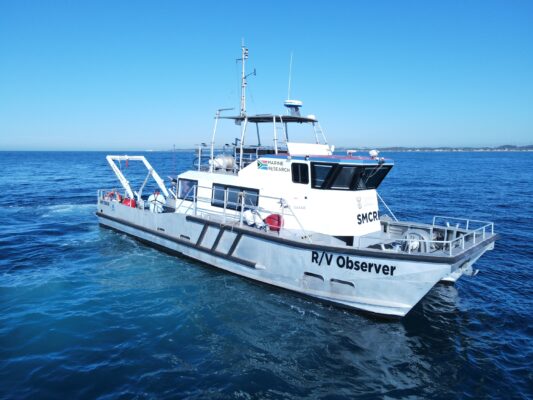DEEPENING OFFSHORE RESEARCH CAPACITY IN SOUTH AFRICA

Last week, Hub researcher Kerry Sink (South Africa National Biodiversity Institute) and a team of marine scientists in South Africa embarked on a multi-institutional and multi-disciplinary offshore expedition to enhance the capacity of young southern African scientists and to collect data in outer shelf and deep-sea habitats. The cruise is funded by the Hub.
The main aim of the cruise is to develop the capacity of a team of young researchers who can work together to solve the challenges of offshore research and management. Research goals include the use of cutting-edge genetic research to detect environmental DNA of threatened species, exploring patterns in invertebrate and fish biodiversity with increasing depth and work to understand the drivers of these patterns in the dynamic high current environment of the Amathole Offshore Protected Area. The project also includes innovative, social and cultural aspects that recognise the deep human connections with the ocean and the team are working on understanding the use of marine species in medicine and ritual practices, including the identification and mapping of Culturally Significant Areas in the coastal and ocean environment.
The cruise is funded by the One Ocean Hub and it’s an initiative of the Capacity Strengthening component of the Hub. Last year, Hub researchers together with collaborators undertook a study to understand the challenges and solutions to develop capacity for deep-sea research and management in South Africa. One of the recommendations was to hold dedicated in-country expeditions using available or locally developed technology under local conditions. This can provide relevant opportunities for more researchers and is a valuable addition to the more common approach where one or two scientists are able to participate in an international expedition with equipment that is usually not available in-country.
Deep capacity
The expedition is led by a young marine biologist, Luther Adams (South African National Biodiversity Institute).
“This expedition is allowing me to achieve a life-long dream to explore South Africa’s oceans and to use modern technology and new techniques to uncover the secrets that lie far beneath the sea surface”, he says.

The research gear includes a Remotely Operated Vehicle (ROV), deep-sea landers and oceanographic instruments. The ROV captures video and images and can collect biological samples using a manipulator arm. Researchers will explore underwater caves and canyons and hope to find the elusive coelacanth which was first trawled off East London in South Africa in 1938 but since then has only been seen much further north of Pumula and Sodwana Bay in KwaZulu-Natal and in other countries in East Africa.
Landers are remote underwater video stations that are baited and allow scientists to record fish, sharks and other deep-sea creatures attracted to the bait. The team hope to deploy the landers to depths of up to 900 meters and it is the first time that such technology is being used below 363 meters in South Africa. Thembelihle Dube, a participating masters student from Rhodes University is particularly excited to see what fish will be found in deeper waters:
‘’This expedition will provide our first glimpse of what’s happening beyond the shelf in this poorly studied region’’.